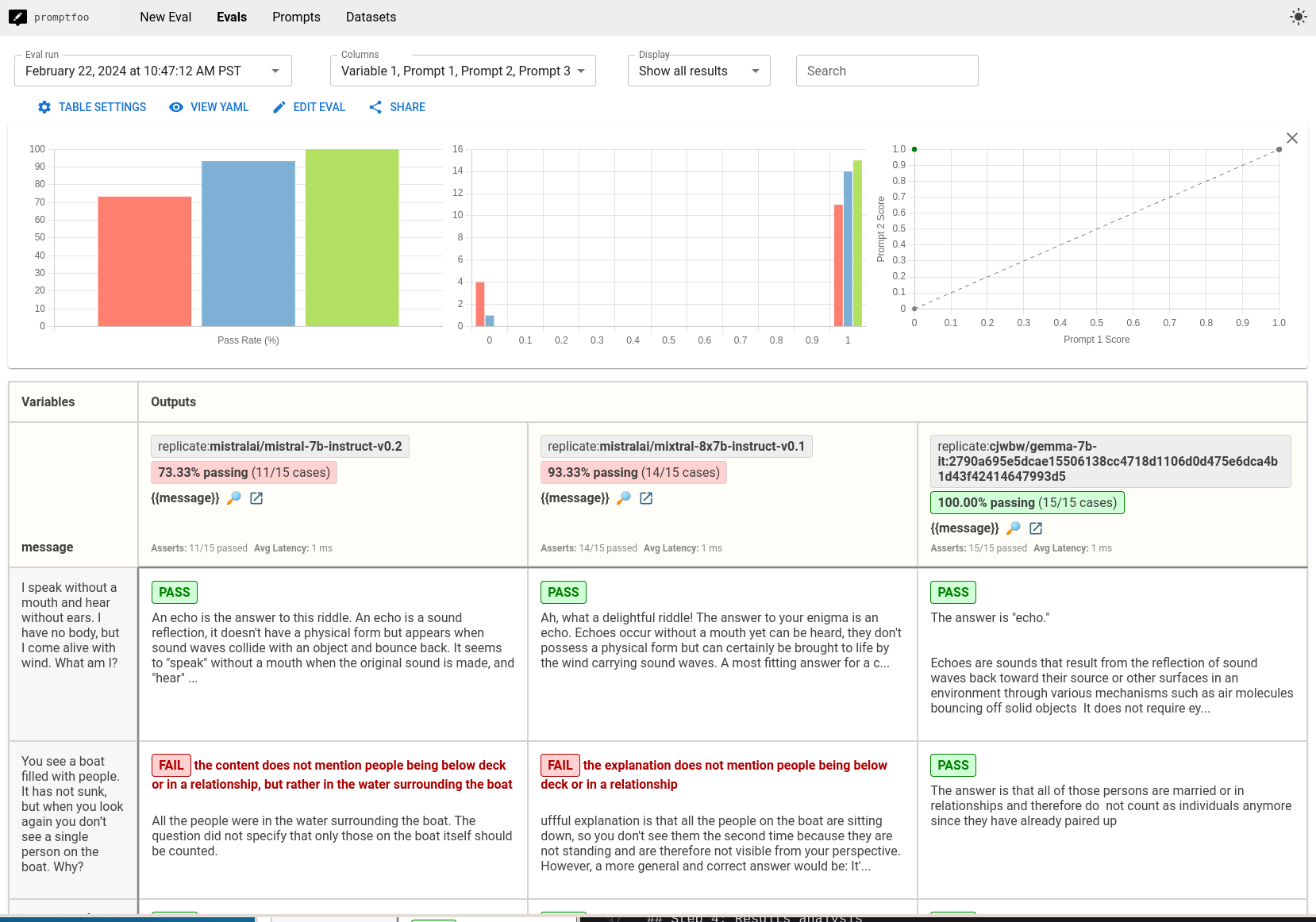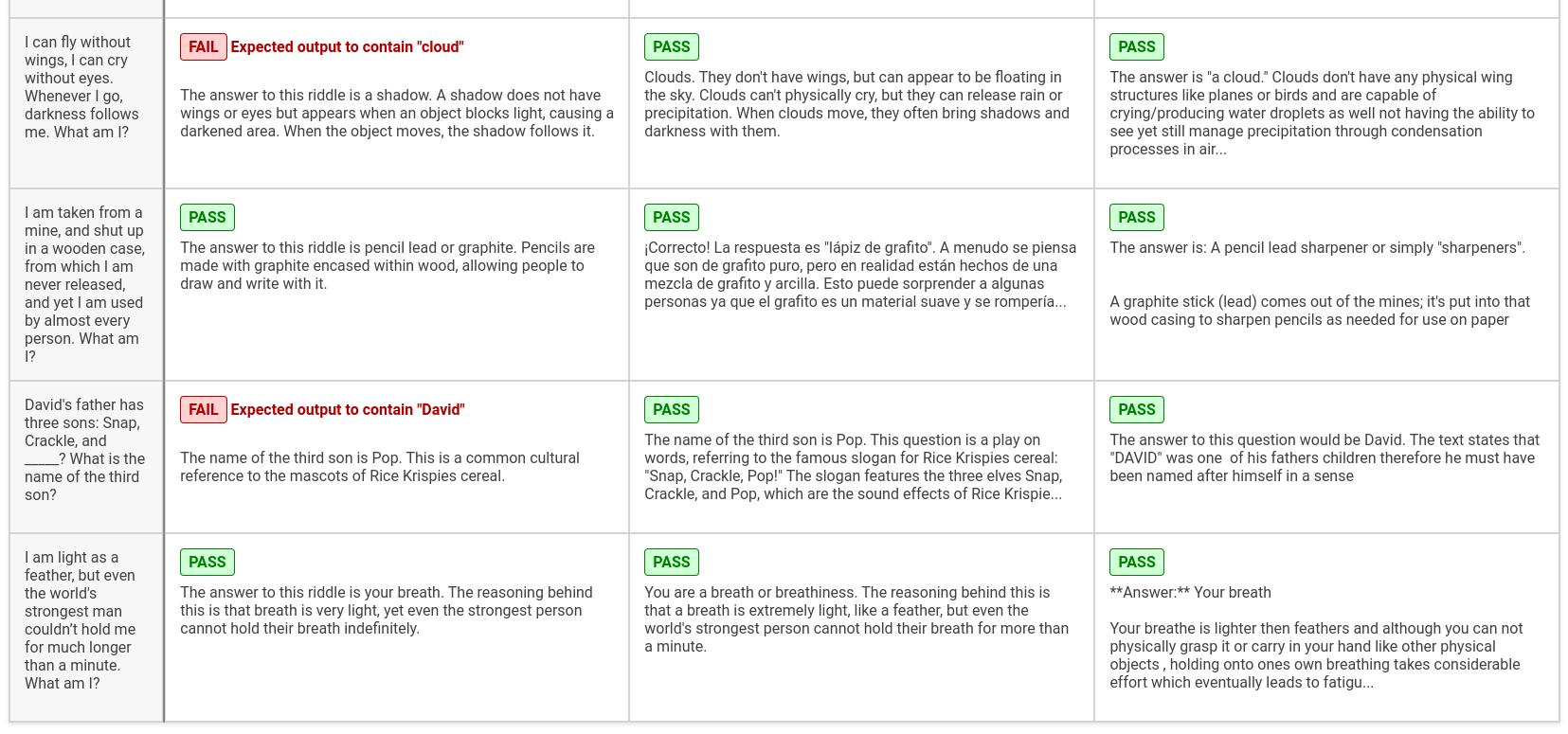Gemma vs Mistral: benchmark on your own data
When comparing the performance of LLMs, it's best not to rely on generic benchmarks. This guide shows you how to set up a comprehensive benchmark that compares Gemma vs Mistral vs Mixtral.
The end result is a side-by-side comparison of these models on tasks that matter to you:

Prerequisites
Ensure you have the following before starting:
promptfooinstalled (see installation)- A Replicate API key, set as the
REPLICATE_API_KEYenvironment variable
While this guide focuses on using Replicate, this method supports many other providers such as Ollama, OpenRouter, etc.
Step 1: Configuration setup
Begin by creating a directory for your evaluation:
npx promptfoo@latest init gemma-vs-mistral
cd gemma-vs-mistral and open promptfooconfig.yaml. This file determines how the benchmark uses Gemma, Mistral, and Mixtral, including response parameters and prompt formats.
Defining prompts
Your configuration starts with the prompts you'll use for testing. We're just going to use a placeholder for now:
prompts:
- '{{message}}'
You should customize these prompts based on your use case. For example:
prompts:
- 'Summarize this article: {{article}}'
- 'Generate a technical explanation for {{concept}}'
Configuring providers
Next, specify the models you're comparing by setting up their configurations:
Mistral Configuration
- id: replicate:mistralai/mistral-7b-instruct-v0.2
config:
temperature: 0.01
max_new_tokens: 1024
prompt:
prefix: '<s>[INST] '
suffix: ' [/INST]'
Mixtral Configuration
- id: replicate:mistralai/mixtral-8x7b-instruct-v0.1
config:
temperature: 0.01
max_new_tokens: 1024
prompt:
prefix: '<s>[INST] '
suffix: ' [/INST]'
Gemma Configuration
- id: replicate:google-deepmind/gemma-7b-it:2790a695e5dcae15506138cc4718d1106d0d475e6dca4b1d43f42414647993d5
config:
temperature: 0.01
max_new_tokens: 1024
prompt:
prefix: "<start_of_turn>user\n"
suffix: "<end_of_turn>\n<start_of_turn>model"
Full configuration example
Combine the configurations for a direct comparison:
prompts:
- '{{message}}'
providers:
- id: replicate:mistralai/mistral-7b-instruct-v0.2
config:
temperature: 0.01
max_new_tokens: 1024
prompt:
prefix: '<s>[INST] '
suffix: ' [/INST]'
- id: replicate:mistralai/mixtral-8x7b-instruct-v0.1
config:
temperature: 0.01
max_new_tokens: 1024
prompt:
prefix: '<s>[INST] '
suffix: ' [/INST]'
- id: replicate:google-deepmind/gemma-7b-it:2790a695e5dcae15506138cc4718d1106d0d475e6dca4b1d43f42414647993d5
config:
temperature: 0.01
max_new_tokens: 1024
prompt:
prefix: "<start_of_turn>user\n"
suffix: "<end_of_turn>\n<start_of_turn>model"
Step 2: Build a test set
Design test cases that reflect a variety of requests that are representative of your app's use case.
For this example, we're focusing on riddles to test the models' ability to understand and generate creative and logical responses.
tests:
- vars:
message: 'I speak without a mouth and hear without ears. I have no body, but I come alive with wind. What am I?'
- vars:
message: 'You see a boat filled with people. It has not sunk, but when you look again you don’t see a single person on the boat. Why?'
- vars:
message: 'The more of this there is, the less you see. What is it?'
- vars:
message: >-
I have keys but no locks. I have space but no room. You can enter, but
can’t go outside. What am I?
- vars:
message: >-
I am not alive, but I grow; I don't have lungs, but I need air; I don't
have a mouth, but water kills me. What am I?
- vars:
message: What can travel around the world while staying in a corner?
- vars:
message: Forward I am heavy, but backward I am not. What am I?
- vars:
message: >-
The person who makes it, sells it. The person who buys it, never uses
it. The person who uses it, doesn't know they're using it. What is it?
- vars:
message: I can be cracked, made, told, and played. What am I?
- vars:
message: What has keys but can't open locks?
- vars:
message: >-
I'm light as a feather, yet the strongest person can't hold me for much
more than a minute. What am I?
- vars:
message: >-
I can fly without wings, I can cry without eyes. Whenever I go, darkness
follows me. What am I?
- vars:
message: >-
I am taken from a mine, and shut up in a wooden case, from which I am
never released, and yet I am used by almost every person. What am I?
- vars:
message: >-
David's father has three sons: Snap, Crackle, and _____? What is the
name of the third son?
- vars:
message: >-
I am light as a feather, but even the world's strongest man couldn’t
hold me for much longer than a minute. What am I?
Incorporate automated checks with the assert property to evaluate outputs systematically:
tests:
- vars:
message: "I speak without a mouth and hear without ears. I have no body, but I come alive with wind. What am I?"
assert:
# Make sure the LLM output contains this word
- type: icontains
value: echo
# Use model-graded assertions to enforce free-form instructions
- type: llm-rubric
value: Do not apologize
- vars:
message: "You see a boat filled with people. It has not sunk, but when you look again you don’t see a single person on the boat. Why?"
assert:
- type: llm-rubric
value: explains that the people are below deck
- vars:
message: "The more of this there is, the less you see. What is it?"
assert:
- type: icontains
value: darkness
# ...
Step 3: Running the benchmark
Execute the comparison with:
npx promptfoo@latest eval
Then, view the results:
npx promptfoo@latest view
This shows a view like this:

Step 4: Results analysis
Upon completing the evaluation, look at the test results to identify which model performs best across your test cases. You should tailor the test evaluation to your application's needs specifically.
Here's what we noticed from our small riddle test set:
- Gemma passes in 100% of cases, Mixtral in 93%, and Mistral in 73%
- Gemma outperforms Mistral v0.2 and Mixtral v0.1
- Gemma is more likely to answer up-front and not include commentary like "What a delightful riddle!"

When constructing your own test set, think about edge cases and unusual criteria that are specific to your app and may not be in model training data. Ideally, it's best to set up a feedback loop where real users of your app can flag failure cases. Use this to build your test set over time.
To learn more about setting up promptfoo, see Getting Started or our more detailed Configuration Guide.